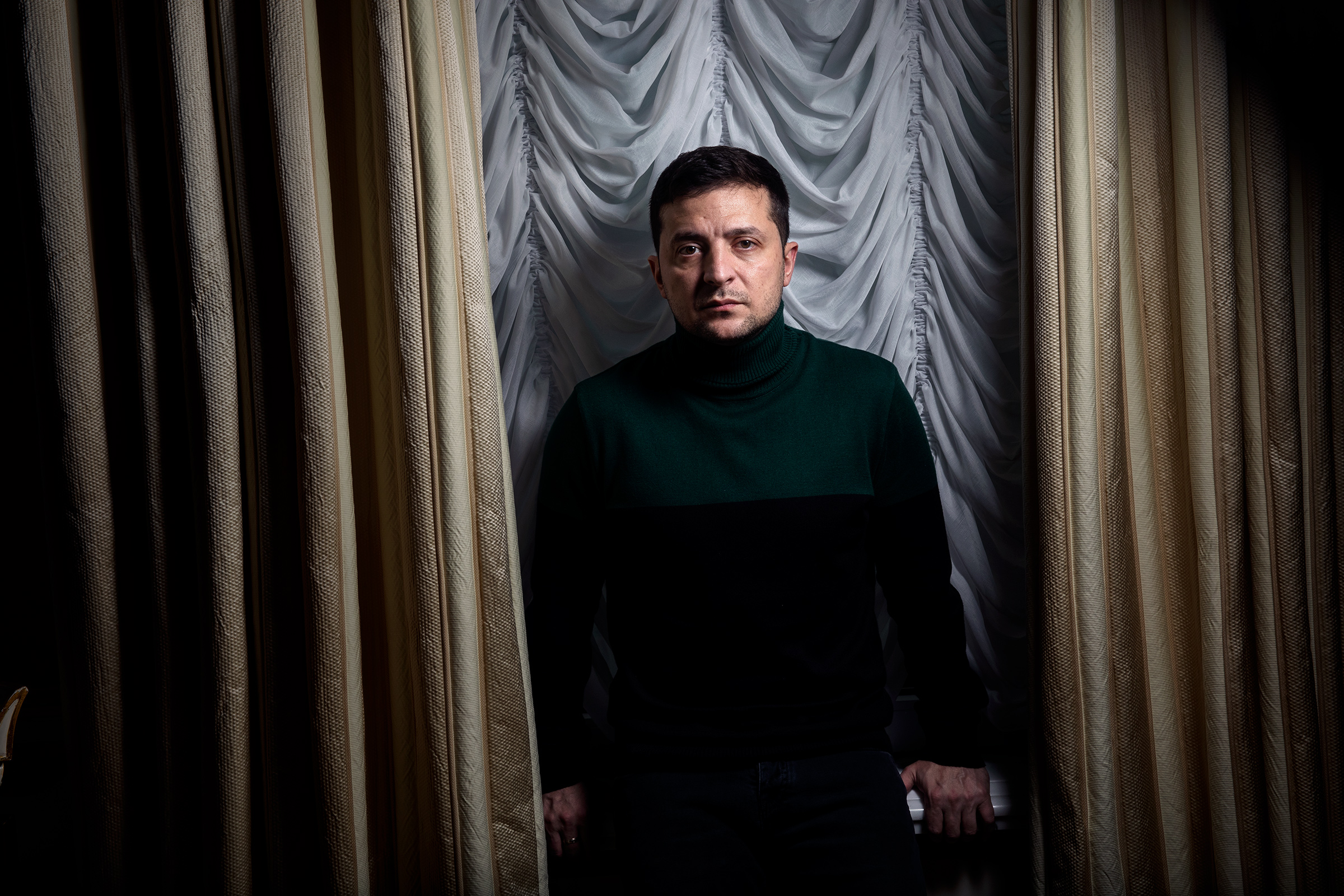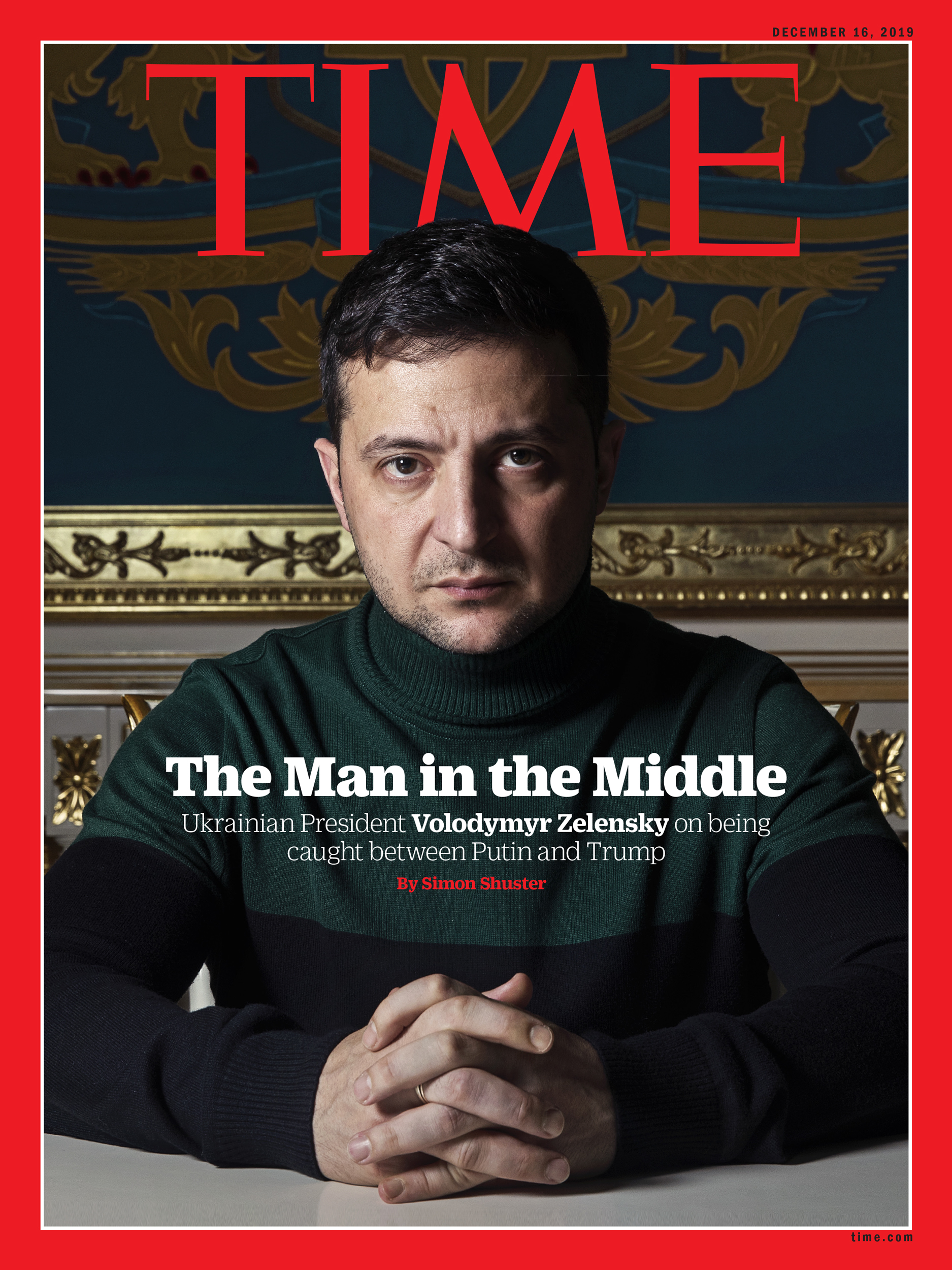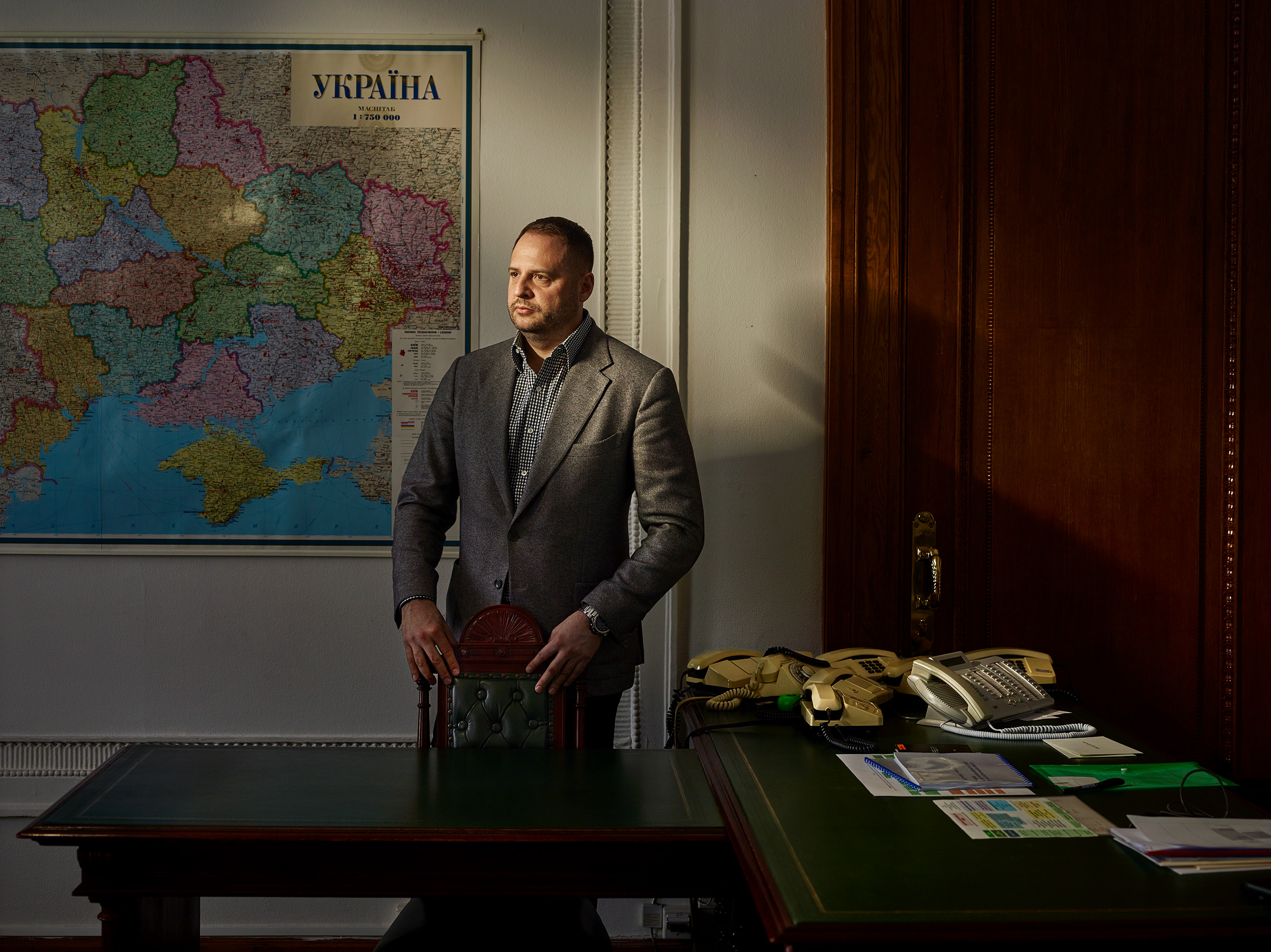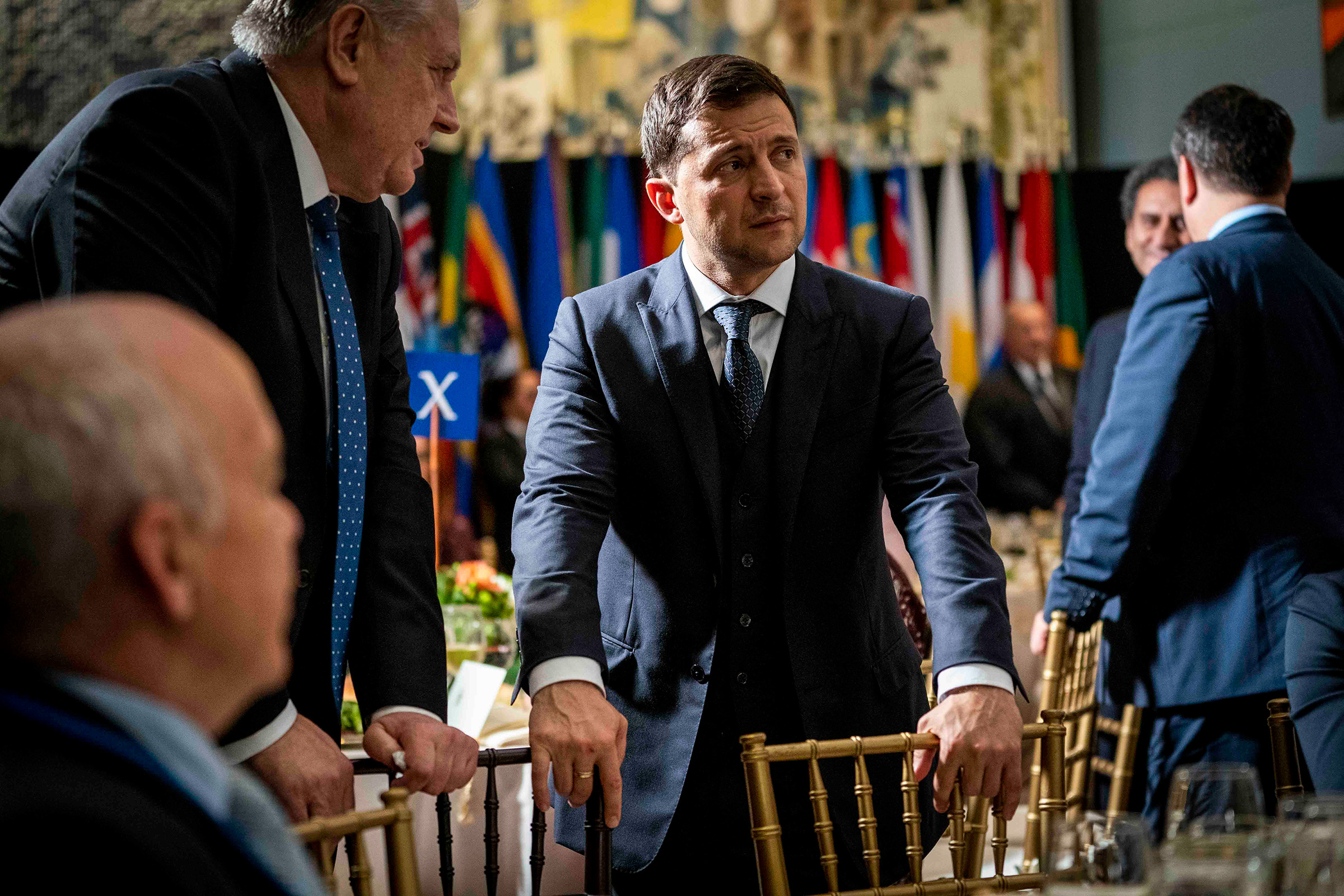
A year is a long time in politics.
Long enough in the case of Volodymyr Zelensky, the comedian elected President of Ukraine, to go from the set of his sitcom in Kyiv to the biggest political drama in the world, the one in which an American President may wind up getting impeached.
The Democrats have cast Zelensky as the victim of President Donald Trump’s abuse of power, even as Republicans treat him as the witness key to proving Trump’s innocence. Neither role is anywhere close to what Zelensky imagined for himself when he announced his run for the presidency on New Year’s Eve, although he knew the job would be tough if he won, and often very unpleasant. Ukraine has been at war with Russia for the past five years, and his priority as President would be to stop that war from taking any more lives–a toll that is now more than 13,000 and counting.

That task would mean confronting Vladimir Putin, the Russian President who first ordered his troops into Ukraine in 2014. But Zelensky also wondered early on about Trump and the challenges of working with him. “What’s he like?” he asked me when we first met in March, backstage at his comedy show, which he was using to promote his run for Ukraine’s highest office. “Normal guy?” Wedged between the mirror and the costume rack inside his dressing room, the 41-year-old seemed confident, even cocky, in planning to win Trump over with little more than a wisecrack and a smile. “We’ll figure it out,” he told me. “I’m sure we’ll get along.”
Things have turned out rather differently. At the point in its history when Ukraine needs American support the most, Trump has gone out of his way to paint the nation as corrupt, unreliable and opposed to his Administration. Russia has rejoiced at these characterizations. And Ukraine’s key allies in Europe have put on a mask of cool neutrality, voicing support for Zelensky while also seeking deals with Putin. Zelensky cannot even count on outspoken support from the U.S. diplomats and officials who testified so ardently about his country’s strategic and moral import in front of the House Intelligence Committee. Several have quit amid the impeachment saga, others will soon retire, and one tells TIME he is “laying low,” at least until the issue of Ukraine becomes a bit less toxic in Washington.
Zelensky has come to accept that. When we met again in November, he had aged and changed far more than one might expect in the span of eight months. He was not just more tired or more of a realist but seemed to have caught a strain of the political disease he once detested and wanted to cure: cynicism. “I live here,” he said as we sat down in the presidential chambers, looking around at the gilt and the imposing furniture, “like in a fortress that I just want to escape.” One of his closest aides, Serhiy Shefir, who also spent his career in comedy before his friend became the President, could barely remember the time we had met in March at their variety show. “That was a different lifetime,” he told me.

Like many people in Ukraine, Zelensky has followed coverage of the impeachment inquiry unfold in the U.S. Congress. Not closely, he says, but enough to know what the Democratic majority has accused Trump of doing. Nearly every witness who testified before the inquiry confirmed that Trump blocked about $400 million in aid to Ukraine this summer as a way to pressure Zelensky’s government. Trump’s aim, according to these witnesses, was to get Ukraine’s help in his re-election campaign by launching spurious investigations into Trump’s political rivals–in particular, his chief opponent in the 2020 race, former Vice President Joe Biden, whose son Hunter served on the board of a Ukrainian energy company. Several key witnesses called this a “quid pro quo,” or a favor for a favor. The Democrats said it was tantamount to bribery. Trump and his allies dismissed the hearings as a witch hunt intent on destroying his presidency.
Zelensky and his aides kept quiet about the hearings, not wanting to get dragged even deeper into the political brawls of their most important ally. So in a roundtable interview with TIME and three other publications on Nov. 30, he addressed not the question at the heart of impeachment–what Trump wanted–but only his own motivations. “Look, I never talked to the President from the position of a quid pro quo. That’s not my thing,” he said. “I don’t want us to look like beggars. But you have to understand. We’re at war. If you’re our strategic partner, then you can’t go blocking anything for us. I think that’s just about fairness. It’s not about a quid pro quo.”
From the start of his tenure, the man Zelensky entrusted to deal with the Americans was Andriy Yermak, who had previously worked for years as a lawyer for the President’s comedy troupe. Tall and imposing, with a booming voice and a habit of pounding the table for emphasis, Yermak had to manage the stream of requests to investigate Trump’s political rivals. At first they came up this spring from Trump’s personal lawyer Rudy Giuliani and later from various U.S. officials and diplomats drawn into the pressure campaign.

For Yermak it meant months of debating these investigations, whether to open them and how to announce them in public. The entire time, he says, he stuck to one principle: “Zelensky and his team will never get mixed up in the internal politics of the United States of America, under any circumstances.” They managed to hold that line long enough for a whistle-blower to raise the alarm about Trump and Giuliani’s conduct over Ukraine. By early September, as news of that complaint made its way to Congress, the package of aid to Ukraine was finally released.
Yermak’s relief did not last long. With the start of the impeachment inquiry in September, his country was again dragged into the center of a partisan brawl in Washington; only this time it was televised. “To be honest, we’re tired of these discussions,” he told me in his office on Dec. 4, the day the House Judiciary Committee took up the inquiry for a fresh round of witness testimony and debate. “The entire time you’ve spent talking about this, we’ve had people dying in the war out east.”
That war began as a Russian response to Ukraine’s revolution, which put the country on a path toward closer alignment with Europe in 2014 and forced the leaders of the old regime to seek refuge among their patrons in Moscow. The Kremlin struck back that February by sending troops to occupy Ukraine’s Crimean Peninsula. By the spring, the Russian forces had sparked a bigger conflict in the region known as the Donbass, part of Ukraine’s industrial heartland in the east. Millions of people have since fled the fighting. Separatists armed by Moscow have seized control of two major cities in the Donbass. But even as Putin began this year to hand out Russian passports to the locals, he has shown no interest in absorbing these lands into Russia, apparently content to let the conflict fester, a permanent drag on the success of his neighbor, its economy and its chance of integrating with the West.
That’s the main drama Zelensky has tried to focus on, especially as Ukraine gets closer to another chance at peace. On Dec. 9 at the Élysée Palace in Paris, he is due to sit down for the first time with Putin. The encounter pits a onetime TV star barely six months into the job against a KGB veteran in power for two decades, who has fought brutal wars before and won them.
Away from the battlefield, things are also going Russia’s way. The impeachment inquiry has thrown American policy toward Europe into confusion. A handful of the U.S. diplomats with the most clout in the region have quit in protest at Trump’s treatment of Ukraine, given damning testimony against Trump in Congress, or both.
Meanwhile, Trump and his defenders have taken to repeating Putin’s deflective claims that it was Ukrainian politicians rather than Russian spies who meddled in the 2016 U.S. presidential election. This was in flat contradiction to U.S. intelligence, which had concluded long before that Putin ordered his agents to steal and spread the secrets of the Hillary Clinton campaign. But Trump persisted in blaming Ukraine. Putin was elated. “Thank God,” he told a business conference about two weeks before the peace talks in Paris. “Nobody is accusing us anymore of interfering in the U.S. elections. Now they’re accusing Ukraine.”
Zelensky has been left with no choice but to put his faith in the diplomats from Germany and France, who will serve as mediators at the talks in Paris. In an effort to reach these nations, he invited two of their best publications to the roundtable interview on Nov. 30, as well as a reporter from Poland, Ukraine’s most ardent ally in the European Union.
One of them posed a seemingly straightforward question: Do you trust Putin? For Zelensky, it was a perfect chance to vent at his nation’s tormentor and score some easy points at home. But he took it differently. “I don’t trust anyone at all,” he said. “Politics is not an exact science. That’s why in school I loved mathematics. Everything in mathematics was clear to me. You can solve an equation with a variable, with one variable. But here we have all variables.” Even among allies, Zelensky suggested, “Nobody can have any trust. Everybody just has their interests.”
It was hard to fault Zelensky for feeling alone. Two days earlier he had spoken on the phone with German Chancellor Angela Merkel, who had long held the line when it came to Ukraine, demanding discipline among the Europeans even as some of them called for an end to the sanctions imposed against Russia for its attack against Ukraine. But the German wall around Zelensky thins where German business interests come in.
Even as Merkel prepared for the talks in Paris and called on Putin to participate, she was rushing to complete an energy project with Russia that could potentially cripple Ukraine’s economy next year. Known as Nord Stream 2, the new pipeline would bypass Ukraine by carrying Russian fuel under the Baltic Sea to Germany. The estimated loss for Zelensky’s government would be about $3 billion per year in revenues from the transport of gas to Europe, a sum that dwarfs the $400 million in aid that Trump held up this summer and early fall. “If it’s built, then Ukraine will suffer enormously,” Andriy Kobolyev, the head of Ukraine’s state gas company, tells TIME. “The only way to stop this is U.S. sanctions.”
But that does not seem likely, at least not before the pipeline is due to become operational at the start of 2020. Many of the U.S. officials who led the push against this project–chief among them John Bolton, Trump’s most recently departed National Security Adviser–have left the Administration, and the impeachment inquiry has pushed the issue down on the U.S. agenda in Ukraine. “With the departure of those officials,” says Kobolyev, “we see significantly less people in U.S. who are willing to discuss with us that matter. And that bothers me a lot right now.”
It bothers Zelensky too. But there is not much he can do about it unless the U.S. has his back. Despite a death toll that climbs by the week, with nightly shelling near civilian areas and the persistent threat of sniper fire, the only active war in Europe seldom tops the evening news in Paris, Berlin or London. The Dec. 9 talks will be the first major peace summit in more than three years, a lull in negotiations that saw thousands of Ukrainians killed in their own homeland. Before that, there were hardly any breakthroughs in the conflict, and peace talks would go in circles as if that were their only goal. “People came to these meetings intending for nothing to happen,” Zelensky says.
He doubts this time will be much different. The host of the summit, French President Emmanuel Macron, made some remarks in November that worried the Ukrainians. Russia is no longer an enemy of NATO, Macron said, and should be treated as a partner. In an interview with the Economist, the French leader also suggested that the NATO military alliance, which has guaranteed the security of Europe since the end of World War II, was “experiencing brain death” and may no longer be willing to defend its member states from an attack.
The remarks, which officials in Moscow celebrated, caused a rare clash between Merkel and Macron. During a private dinner in November, the German Chancellor is reported to have told Macron that she was tired of “picking up the pieces” after his disruptive statements. “Over and over, I have to glue together the cups you have broken so that we can then sit down and have a cup of tea together,” Merkel said, according to the New York Times.
Asked about these remarks during our interview, Zelensky looked surprised. “He really said that?” the President marveled, referring to Macron. Zelensky had not been paying much attention to the European squabbles; he has had enough problems to deal with at home. As the peace talks approached, hard-liners and militants inside Ukraine had accused him of capitulating to Russia, and his popularity ratings had gone into free fall. But he refused to yield to their demands to retake the Donbass by force.
“I won’t do it,” he told us. “I cannot send them there. How? How many of them will die? Hundreds of thousands, and then an all-out war will start, an all-out war in Ukraine, and then across Europe.”
As the interview wound down, there was a final chance to ask him about the impeachment inquiry, though the topic suddenly seemed petty compared with the fires Zelensky was fighting. He didn’t brush the issue aside, though he clearly understood how dangerous it was, how high the risk of angering either side in the internal struggles of a superpower. “But I’m not afraid of the impeachment questions,” he said, forcing a smile.
The message he had for the U.S. and other “empires,” he said, was a plea to remember that Ukraine is a nation in its own right, not merely a tool in the games of foreigners. “I would never want Ukraine to be a piece on the map, on the chessboard of big global players, so that someone could toss us around, use us as cover, as part of some bargain.” But if these first six months of his tenure have taught Zelensky anything about the world, it’s that alliances can change as fast as the whims of the world’s decisionmakers. “That’s why,” he said as we stood to say goodbye, “on the question of who I trust, I told you honestly: no one.”
More Must-Reads from TIME
- Donald Trump Is TIME's 2024 Person of the Year
- Why We Chose Trump as Person of the Year
- Is Intermittent Fasting Good or Bad for You?
- The 100 Must-Read Books of 2024
- The 20 Best Christmas TV Episodes
- Column: If Optimism Feels Ridiculous Now, Try Hope
- The Future of Climate Action Is Trade Policy
- Merle Bombardieri Is Helping People Make the Baby Decision
Contact us at letters@time.com